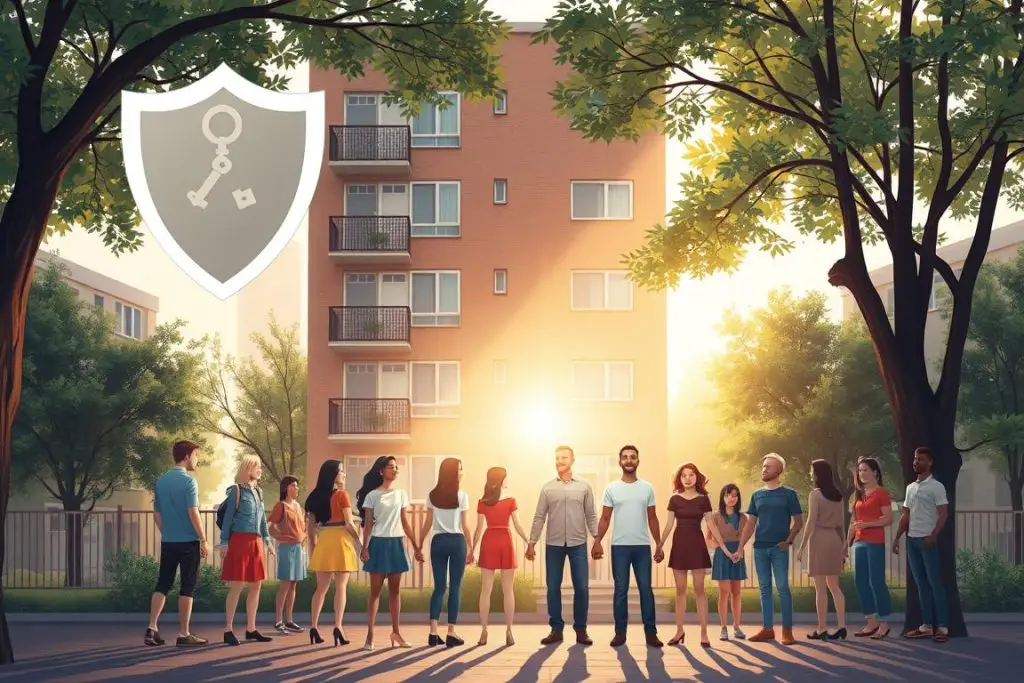Get the Support You Need: Key Housing Assistance Options You Should Know About

In a small Indiana town, as the sun sets, Emma sits surrounded by bills. She cares for her young grandchildren and an elderly parent. The dream of ‘affordable housing’ seems out of reach for many. Yet, hope shines through housing programs designed to help people like Emma. These services, including important grants and loans, offer real support.
Facing housing challenges like Emma? Support is within reach more than ever. The Indiana Housing and Community Development Authority (IHCDA) ensures access to vital resources. These help provide stable, safe homes, especially for the elderly and those with disabilities1.
Resources include Rental Housing Tax Credits and Emergency Solutions Grants. The Ramp Up Indiana initiative also helps by improving accessibility. This support goes beyond buildings. It’s about creating homes of dignity and comfort1.
The state, partnering with the Back Home in Indiana Alliance, offers targeted aid. This benefits elder citizens through rehabilitation and rental housing1. If you’re facing high housing costs or uncertain times, don’t worry. There are many ways to find affordable, respectful housing with ample support.
Key Takeaways
- Discover a variety of housing programs to counter housing expenses and preserve stable living conditions.
- Learn about targeted affordable housing assistance services to support the elderly and individuals with disabilities.
- Understand the importance of housing support services in maintaining community wellness.
- Explore options for housing grants and loans that pave the way toward secure housing solutions.
- Identify partnerships and initiatives that augment resources available for securing and retrofitting housing for comfort and accessibility.
Navigating FEMA Disaster Recovery Assistance for Housing
When disaster hits, figuring out how to recover, especially with housing, can feel overwhelming. FEMA works closely with other government efforts to help those affected. It’s important to know how FEMA’s help works so you can recover better after a crisis.
Understanding FEMA’s Role Post-Disaster
After a natural disaster, FEMA comes in to help with housing recovery. They provide not just quick, temporary housing and repairs but also help plan long-term recovery. Since March 22, 2024, they’ve made it easier for people to get help, cutting down on paperwork2. By working with HUD and using CDBG-DR funds, FEMA helps build stronger communities after disasters3.
Applying for Assistance with Temporary Housing and Repairs
Right after a disaster, you should apply for FEMA housing aid. This is for homeowners and renters whose homes are not liveable. The DisasterAssistance.gov site is now easier to use, and you’ll spend 15% less time signing up2. FEMA now also helps self-employed people get funds to fix or replace tools and equipment they need for work2.
Maximizing Other Needs Assistance from FEMA
FEMA also offers help for things other than housing, like paying for medical care, childcare, and fixing or replacing computers needed for work or school2. Knowing about these benefits and recent changes, like not needing an SBA loan application for some FEMA aid, can really impact your recovery2.
These changes work well because of teamwork with HUD. This has made recovery faster with specific waiver packages, speeding up help in Florida, Hawaii, and Mississippi3. Introducing flexible policies aims at a better and quicker disaster recovery system.
To get the most out of these assistance programs, you need to keep up with the latest in government housing plans and disaster recovery updates. With new steps taken by FEMA and partnerships with HUD and SBA, there’s strong support for those needing to rebuild their lives after a disaster. Getting involved early with these programs can help you use all the resources available for a quicker stabilization and rebuilding process.
Preventing Eviction and Safeguarding Your Tenancy Rights
Housing costs are climbing, making it tough to keep your home. With the right knowledge, you can prevent eviction and protect your rights. Here are ways to stay empowered despite housing challenges.
Strategies for Struggling to Pay Rent
Meeting rent can be hard when money is tight. But, there’s help available. The Emergency Rental Assistance Program (ERAP) helps families avoid losing their homes by providing financial support4. Also, Housing Court Answers guides people on how to cover overdue rent. It connects them with charities and groups that help stop evictions4.
Resources to Protect Against Eviction and Housing Scams
Legal help is key to fighting evictions. In New York City, the Right-to-Counsel (RTC) law means tenants can get legal help in all areas4. Also, the Eviction Protection Grant Program offers aid to over 35,000 households. It ensures more tenants, especially those less advantaged, have legal support against eviction5.
Ensuring Your Consumer Protection in Housing Matters
Knowing consumer protection laws helps keep your housing secure. Landlords must warn tenants about late rent before eviction processes start4. Plus, with HUD’s $20 million support, more low-income tenants can get legal help. This helps prevent evictions and maintains housing stability, especially during the pandemic6.
| Service | Scope | Impact |
|---|---|---|
| Emergency Rental Assistance Program (ERAP) | National | Helps avoid homelessness |
| Legal representation (RTC) | New York City | Representation in housing disputes |
| Eviction Protection Grant Program | 35,000 households | Legal assistance in evictions span> |
| HUD legal assistance funding | National | Enhanced access to legal services6 |
Knowing about these resources and rights helps you deal with the housing system better. It keeps you stable and safe from unfair eviction and scams. Use these programs and stay informed for better housing support and a safer renting experience.
Housing Programs and Solutions for Older Adults
As you get older, finding a safe and affordable place to live is more important7. People over 55 often spend most on housing, a survey shows7. And with almost 10 million older adults struggling with this expense before the pandemic, it’s a big issue7. Luckily, there are many programs just for seniors that can help ease this burden. They provide nice places to live without costing too much. In times of rising costs and rent, government help through emergency rental programs has been crucial for many seniors hit by the pandemic’s economic effects7.
Public housing is a key option, helping low-income families, seniors, and those with disabilities7. If you own a home and are over 62, you might think about using your home’s value or getting a reverse mortgage. This could make staying in your home more manageable. Also, sharing your home with others has become a popular way for older adults to lessen living costs or make some extra money7. Yet, it’s important to think about how these choices might affect your finances in the long run.
The Section 202 Supportive Housing for the Elderly Program is special because it gives nonprofit groups interest-free money to build housing for very low-income older people8. This program, which gets renewed funding based on availability8, sets rules for who can apply, focusing on nonprofits and consumer cooperatives8. If you or someone in your home is 62 or older, looking into this could be a great move8. When going for these programs, it’s crucial to keep an eye out on Grants.gov for when money is offered, so you’re ready to apply.
Looking into these affordable housing programs could really change how you manage your money7. There are many options out there for older adults to find a safe and stable place to live. Doing so can make their later years more enjoyable and less worrisome.
FAQ
What housing programs are available to help me afford housing?
How can I get housing assistance if I’m affected by a disaster?
What is FEMA’s role in post-disaster housing recovery?
How can I apply for assistance with temporary housing and repairs post-disaster?
What Other Needs Assistance does FEMA offer, and how can I maximize it?
What strategies are available for struggling to pay rent and preventing eviction?
How can I protect against eviction and identify housing scams?
How do I ensure my consumer protection in housing matters?
What housing assistance is available specifically for seniors?
What are some long-term housing solutions for older adults facing financial challenges?
Source Links
- Housing Programs – https://www.cdss.ca.gov/inforesources/cdss-programs/housing-programs
- Reforming Individual Assistance: New Benefits and Streamlined Processes to Help Disaster Survivors – https://www.fema.gov/assistance/individual/2024-reform
- HUD Disaster Resources – https://www.hud.gov/hurricane-helene
- Eviction Prevention – HPD – https://www.nyc.gov/site/hpd/services-and-information/eviction-prevention.page
- Eviction Protection Grant Program | HUD USER – https://www.huduser.gov/portal/eviction-protection-grant.html
- HUD Evictions Guidance – https://www.hud.gov/rent_relief/eviction_guidance
- How Older Adults Can Get Help Paying for Housing – https://www.ncoa.org/article/how-older-adults-can-get-help-paying-for-housing/
- Multifamily Housing – Program Description: Section 202 Supportive Housing for the Elderly Program – https://www.hud.gov/program_offices/housing/mfh/progdesc/eld202






